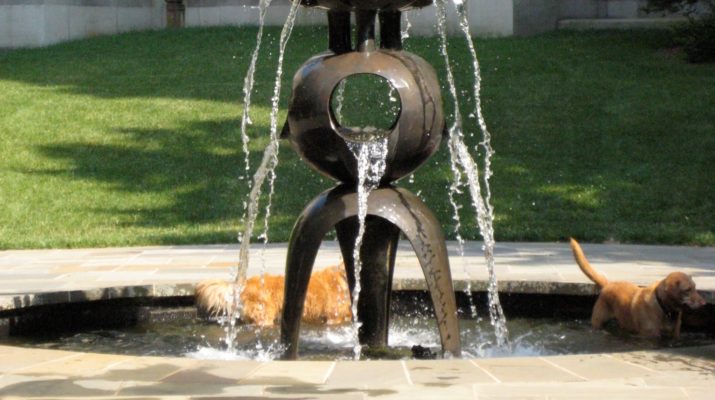Psalm 36
To the leader.A Of David,B the servantC of the Lord.D
A “leader” = natsach. Properly, something that glitters from a distance. So, something that stands out, excels, has status/standing (such as a chief musician or superintendent of Temple services). This can also mean to be permanent or enduring.
B “David” = David. From the same as dod (beloved, love, uncle); the root may mean to boil, which is used figuratively to describe love. So, this implies someone you love such as a friend, a lover, or a close family member like an uncle. David’s name likely means something like “beloved one.”
C “servant” = ebed. From abad (to work, serve, compel; any kind of work; used causatively, can mean to enslave or keep in bondage). This is a servant, slave, or bondservant.
D “Lord” = YHVH. From havah (to be, become) or hayah (to come to pass, become, be). This is the name of the God of Israel, the self-existent and eternal one, the tetragrammaton. This pronunciation has been lost to time so “Lord” is generally used in its place.
1 TransgressionE speaksF to the wickedG
deep inH their hearts;I
E “transgression” = pesha. From pasha (to rebel, offend, quarrel; making a break from proper authority so can also refer to an apostate). This is transgression, rebellion, or sin. It could be a revolt on a national scale or an individual moral one.
F “speaks” = neum. From na’am (to speak a prophecy; properly, to whisper, which implies saying an oracle). This is an utterance or speaking an oracle.
G “wicked” = rasha. This is to be wicked, guilty, make trouble, do wrong. It can also be condemn, guilty, inflict punishment. This verb implies disturbing or violating.
H “deep in” = qereb. Perhaps from qarab (to come near or approach). This is among, in the midst, before, the center It is the inward part, whether literal or figurative. It can also be used for the heart, the site of thoughts and feelings. This word is also used as a technical term for the entrails of the animals who are sacrificed.
I “hearts” = leb. May be related to labab (to encourage; properly, to be encased as with fat; used in a good sense, this means to transport someone with love; used in a bad sense, it can mean to dull one’s senses). This is the heart, courage, one’s inner self, the mind, or the will. Heart is only used in a figurative sense in the Old and New Testaments.
there is no fearJ of GodK
before their eyes.L
J “fear” = pachad. From pachad (to dread, be afraid, thrill, be in awe; feeling startled from a sudden sound or alarm). This is dread, fear, awe, panic. It can also refer to what someone fears or dreads.
K “God” = Elohim.
L “eyes” = ayin. This is eye in a literal or figurative sense so eye, appearance, favor, or a fountain (the eye of the landscape).
2 For they flatterM themselves in their own eyes
that their iniquityN cannot be found outO and hated.P
M “flatter” = chalaq. This is to be smooth in a figurative sense. So, it can refer to the stones that were part of casting lots – hence, apportion, share, distribute. Figuratively, it can also mean to flatter.
N “iniquity” = avon. Perhaps related to avah (to bend, twist, be amiss). This is sin, mischief, guilt, fault, punishment for iniquity, or moral evil.
O “found out” = matsa. This is to find, catch or acquire. It can also mean to come forth or appear. Figuratively, this can mean to meet or be together with.
P “hated” = sane. This is an enemy or foe. It is one that is hated with a personal hatred.
3 The wordsQ of their mouthsR are mischiefS and deceit;T
Q “words” = dabar. From dabar (to speak, declare, discuss). This is speech, a word, a matter, an affair, charge, command, message, promise, purpose, report, request. It is a word, which implies things that are spoken of in a wide sense.
R “mouths” = peh. This is mouth in a literal or figurative sense. So, more literally, it can be beak or jaws. More figuratively, it refers to speech, commands, or promises.
S “mischief” = aven. Root may mean panting as one does when expending a lot of energy, especially when it comes to nothing. This is nothingness, trouble, sorrow, distress, wickedness, evil, harm, sorrow, misfortune, and mischief. It is also used specifically to refer to idols.
T “deceit” = mirmah. From ramah (to betray, deceive, beguile). This is deceit, treachery, guile, or fraud.
they have ceasedU to act wiselyV and do good.W
U “ceased” = chadal. This is properly to be flabby – it implies, to stop, fall, end, rest, leave alone, forsake, or desist. Figuratively this can be lacking or idle.
V “act wisely” = sakal. This is to consider or be prudent and so it can mean to instruct or be an expert. It can also mean dealing prudently, which implies success and prospering. This verb presumes intelligence of the subject. In one form of the verb, it can mean laying cross-wise.
W “do good” = yatab. This is to be good or pleasing, joyful. It can also mean doing good in an ethical sense or be beautiful, happy, successful, or right.
4 They plotX mischief while on their beds;Y
they are setZ on a wayAA that is not good;BB
they do not rejectCC evil.DD
X “plot” = chashab. This is properly to braid or interpenetrate. Literally it is to create or to wear. Figuratively, it can mean plotting – generally in a negative sense. More broadly, this can also mean think, consider, or make account of.
Y “beds” = mishkab. From shakab (to lie down, lodge; lying for sleep, sex, or other reasons). This is a place where one lies down i.e. a bed, couch, or bedchamber. It can also be used in an abstract sense to refer to sleep or euphemistically for sex.
Z “set” = yatsab. This is to set oneself, take a stand, remain, continue, to station or set something in place.
AA “way” = derek. From darak (to tread, march, to walk. Can also mean affixing a string to a box since one needs to step on it to bend it in the process; so also an archer). This is a road as a thing that is walked on. Can be used figuratively for the path that one’s life takes or how one chooses to live one’s life.
BB “good” = tob. From tob (to be pleasing, to be good). This is good, beautiful, pleasant, agreeable, bountiful, at ease. This word is used for goodness as a concept, a good thing, a good person. This can refer to prosperity and welfare as well as joy, kindness, sweetness, and graciousness. So, this is ethically good, but also enjoyably good.
CC “reject” = ma’as. This is to reject, refuse, despise, disdain, reject, or spurn. It can also be to disappear or melt away.
DD “evil” = ra’. From ra’a’ (to be evil, bad, afflict; properly, to spoil – to destroy by breaking into pieces; figuratively, to cause something to be worthless; this is bad in a physical, social, or moral sense; that which displeases, to do harm or mischief, to punish or vex). This is bad, disagreeable, that which causes pain, misery, something having little or no value, something that is ethically bad, wicked, injury, calamity. This refers to anything that is not what it ought to be – a natural disaster, a disfigurement, an injury, a sin.
5 Your steadfast love,EE O Lord, extends to the heavens,FF
your faithfulnessGG to the clouds.HH
EE “steadfast love” = chesed. From chasad (being good, kind, merciful; may mean bowing one’s neck as is done in the presence of an equal for courtesy’s sake; so, if one in a superior position is treating you like an equal, that is what is captured here). This is favor, goodness, kindness, loving kindness, pity, reproach, or a good deed. When done by God to humanity, this is mercy/loving kindness. When done by humanity to God, it is piety.
FF “heavens” = shamayim. Root may mean being lofty. This is sky, the air, or heaven. It is in a dual noun form so this might refer to the part of the sky where the clouds move on the one hand and the part beyond that where the sun, moon, and stars are on the other hand.
GG “faithfulness” = emunah. From aman (to believe, endure, fulfill, confirm, support, be faithful, put one’s trust in, be steadfast. Figuratively, this is to be firm, steadfast, or faithful, trusting, believing, being permanent, morally solid). This word is literally firmness, but figuratively fidelity, faithfulness, honesty, responsibility, trust, truth, steadfastness. This word shares a root with the word “Amen.”
HH “clouds” = shachaq. From shachaq (to rub off, wear away, pulverize). This is powder, dust, vapor. It can also rfer to the sky or a cloud.
6 Your righteousnessII is like the mightyJJ mountains,
your judgmentsKK are like the greatLL deep;MM
II “righteousness” = tsedaqah. From the same as tsedeq (rightness, righteousness, vindication. It is everything that is just or ethical. That which is right in a natural, moral, or legal sense. It also includes just weights (i.e. true weights). Figuratively, this is justice, righteousness, equity – even prosperity). This is righteousness, justice, righteous acts, and moral virtue.
JJ “mighty” = el. Related to “God” in v1. This is God or a god. It can also refer to power or one that is mighty.
KK “judgments” = mishpat. From shaphat (to judge, defend, pronounce judgment, condemn, govern). This is a verdict or formal sentence whether from humans or from God. It includes the act of judging as well as the place that judging takes place, the suit itself, and the penalty. Abstractly, this is justice, which includes the rights of the participants.
LL “great” = rab. From rabab (increasing in any aspect whether quantity, authority, size, quality, greatness, etc.). This is abundance, many, elder, exceedingly, great. It refers to abundance of amount, rank, or status.
MM “deep” = tehom. Perhaps from hum (to roar, murmur, cause an uproar, agitate; to defeat in battle, destroy). This is the deep or the abyss. Either understood as a formless empty place of nothingness or as a place of confusion filled with water – the deep the feeds the waters of the earth.
you saveNN humansOO and animalsPP alike, O Lord.
NN “save” = yasha. To deliver, defend, help, preserve, rescue, be safe. Properly, to be open, wide or free, which implies being safe. Used causatively, it means to free.
OO “humans” = adam. Perhaps from adam (to be red, make ruddy); related to adamah (ground, dirt, earth). This is man, humankind, also Adam’s name. It refers to a human individual or humanity.
PP “animals” = behemah. This is animal or cattle. It is often used of large quadrupeds.
7 How preciousQQ is your steadfast love, O God!
All peopleRR may take refugeSS in the shadowTT of your wings.UU
QQ “precious” = yaqar. From yaqar (to be precious, costly, rare, valued; properly, to be heavy; figuratively, valuable or inhibit). This is precious, splendid, noble, weighty, or rare. It is valuable in a subjective or objective sense.
RR “people” = ben + adam. Literally “children of people.” Ben is son, age, child. It is son in a literal or figurative sense. Adam is the same as “humans” in v6. See note OO above.
SS “take refuge” = chasah. This is to take refuge or flee for protection. Figuratively, it means to hope or trust in someone or something.
TT “shadow” = tsel. From tsalal (to be or become dark, shade; this is the shade as during twilight or shadow as associated with something opaque). This is shade in a literal or figurative sense. So, it could be shadow, shade, protection, shelter, or defense.
UU “wings” = kanaph. This is wing, edge, corner, extremity. It can also be a flap or fold of a garment or the pinnacle of a building.
8 They feastVV on the abundanceWW of your house,XX
and you give them drinkYY from the riverZZ of your delights.AAA
VV “feast” = ravah. 14x in NT. This is to have one’s thirst satisfied (or figuratively other cravings). It can also mean to soak, water, or satisfy.
WW “abundance” = deshen. 15x in NT. From dashen (to be fat, become greasy, be anointed or prosperous; can also mean to remove ashes from the fat offered for sacrifice). This is the ashes from that fat, fatness more broadly speaking, or, figuratively abundance.
XX “house” = bayit. Probably from banah (to build, make, set up, obtain children; to build literally or figuratively). This is house, court, family, palace, temple.
YY “give them drink” = shaqah. This is to give water to, to cause to drink – to irrigate, drown. It can be used for watering plants or giving water to flocks.
ZZ “river” = nachal. From nachal (to take as heritage, inherit, or distribute). This is a river or stream. It could be a wadi or arroyo – sometimes a narrow valley with no water at all, but in strong rains or when winter snow melts, it swells or floods with water.
AAA “delights” = eden. 5x in NT. From adan (to luxuriate, revel; also, to be pleasant or soft). This is delicate, luxury, or a delight.
9 For with you is the fountainBBB of life;CCC
in your lightDDD we seeEEE light.
BBB “fountain” = maqor. 18x in NT. From qur (to dig, destroy, wall up). This is a spring or fountain. Properly, it is a site that was dug and so it is used for a wellspring. It also refers to natural water sources. It can be used of tears, blood, female genitalia. Figuratively, it can be offspring, posterity, wisdom, or happiness.
CCC “life” = chay. From chayah (to live or keep alive literally or figuratively). This is alive, living, lifetime. It can also be used to describe someone’s age. It can refer to animals, plants, water, or a company or congregation of people. It is life in a very broad sense.
DDD “light” = or. From or (to be or become light). This is light, sun, sunshine, dawn, or daylight. Figuratively, it can refer to light from instruction, light of a face (that is to say one that is cheerful or finds favor). It can refer to prosperity or salvation; a light that guides, a light eternal from Zion.
EEE “see” = raah. This is to see in a literal or figurative sense so stare, advise, think, view.
10 O continueFFF your steadfast love to those who knowGGG you,
and your salvationHHH to the uprightIII of heart!
FFF “continue” = mashak. This is to draw, drag, or pull. It can mean sow, march, remove, draw along, continue, extend, or prolong.
GGG “know” = yada. This is to know, acknowledge, advise, answer, be aware, be acquainted with. Properly, this is to figure something out by seeing. It includes ideas of observation, recognition, and care about something. It can be used causatively for instruction, designation, and punishment.
HHH “salvation” = tsedaqah. Same as “righteousness” in v6. See note II above.
III “upright” = yashar. From yashar (to be straight, right, even, smooth, or agreeable; figuratively, to make something pleasant or prosperous). This is straight, right, level. Also, it is pleasing, whether pleasing God or pleasing other people. So, it is upright or righteous.
11 Do not let the foot of the arrogantJJJ tread on me,
or the handKKK of the wicked drive me away.LLL
JJJ “arrogant” = gaavah. 19x in NT. From gaah (to rise up, be exalted, triumph; figuratively, be majestic). This is majesty, excellency, pride, or arrogance. It can also mean ornament.
KKK “hand” = yad. This is hand, ability, power. Hand in a literal sense, but also what one can do or the means by which one does it.
LLL “drive…away” = nud. This is to nod, waver, wander, flee, show grief, disappear. It can be nodding the head as a sign of sympathy or consolation. It could also be tossing one’s head to show contempt or to taunt.
12 There the evildoersMMM lie prostrate;
they are thrust down,NNN unable to rise.OOO
MMM “evildoers” = paal + aven. Paal is to do, make, work, or accomplish. Generally refers to regularly repeated or systematic action – so, to practice. Aven is the same as “mischief” in v3. See note S above.
NNN “thrust down” = dachah. 11x in NT. This is to push down, drive, thrust, totter, trip, or chase. It can also mean to overthrow or refer to an outcast as one has been pushed down/overthrown.
OOO “rise” = qum. To arise, stand, accomplish, establish, abide. This is rising as in rising against, getting up after being sick or asleep, arising from one state to another, becoming powerful, or rising for action. It can also be standing in a figurative sense.
Image credit: “Joy in the Water” fountain at the National Cathedral in Washington, D.C.




